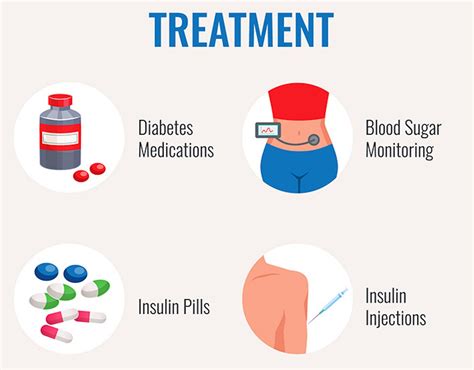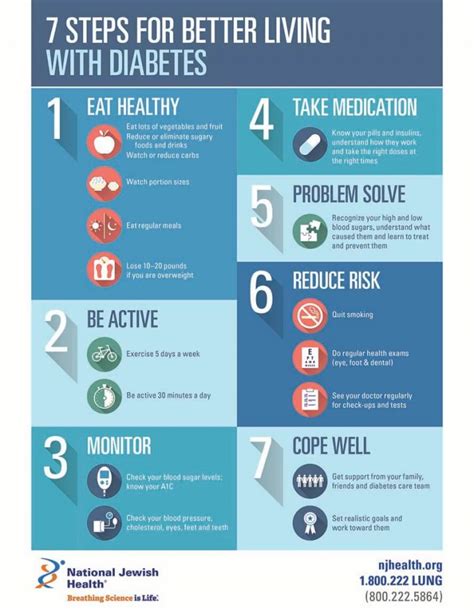Intro
Discover 5 effective ways to manage diabetes, including diet control, exercise routines, and stress management, to regulate blood sugar levels and prevent complications, promoting a healthy lifestyle with diabetes management tips and strategies.
Living with diabetes requires a significant amount of planning, monitoring, and management to maintain blood sugar levels within a target range. Effective diabetes management can help prevent complications, improve quality of life, and reduce the risk of long-term health problems. With the right approach, individuals with diabetes can lead active, healthy lives. In this article, we will delve into the importance of managing diabetes and explore various strategies for achieving optimal blood sugar control.
Diabetes is a chronic condition that affects millions of people worldwide, and its prevalence is increasing rapidly. The disease can cause a range of complications, including heart disease, kidney damage, nerve damage, and vision problems, if left unmanaged. However, with proper care and attention, individuals with diabetes can reduce their risk of developing these complications and enjoy a long, healthy life. Managing diabetes requires a comprehensive approach that incorporates lifestyle modifications, medical treatment, and ongoing monitoring.
The key to successful diabetes management is to work closely with a healthcare team to develop a personalized plan that takes into account individual needs, lifestyle, and health goals. This plan should include strategies for maintaining a healthy diet, engaging in regular physical activity, monitoring blood sugar levels, and managing stress. By adopting a proactive approach to diabetes management, individuals can take control of their condition, reduce their risk of complications, and improve their overall well-being.
Understanding Diabetes Management

Benefits of Diabetes Management
The benefits of effective diabetes management are numerous and well-documented. Some of the most significant advantages of managing diabetes include: * Reduced risk of long-term complications, such as heart disease, kidney damage, and nerve damage * Improved blood sugar control, which can help to prevent symptoms such as fatigue, blurred vision, and increased thirst and urination * Enhanced quality of life, which can include increased energy levels, improved mood, and reduced risk of depression and anxiety * Better overall health and well-being, which can include a reduced risk of infections, improved wound healing, and enhanced immune function * Increased life expectancy, which can be achieved through a combination of lifestyle modifications, medical treatment, and ongoing monitoringStrategies for Managing Diabetes

Creating a Diabetes Management Plan
Creating a diabetes management plan is an essential step in achieving optimal blood sugar control and reducing the risk of long-term health problems. This plan should be developed in consultation with a healthcare team and should take into account individual needs, lifestyle, and health goals. Some of the key components of a diabetes management plan include: * A personalized meal plan that outlines the types and amounts of food to eat, as well as the timing and frequency of meals * A physical activity plan that outlines the types and amounts of exercise to engage in, as well as the frequency and duration of physical activity * A plan for monitoring blood sugar levels, which should include the frequency and timing of blood glucose tests, as well as the target range for blood sugar levels * A plan for managing stress, which can include techniques such as meditation, yoga, or deep breathing exercises * A plan for getting enough sleep, which can include strategies such as establishing a consistent sleep schedule, creating a relaxing bedtime routine, and avoiding caffeine and electronics before bedtimeLifestyle Modifications for Diabetes Management

Medical Treatment for Diabetes
Medical treatment plays a critical role in diabetes management, and can help individuals with diabetes achieve optimal blood sugar control and reduce their risk of long-term health problems. Some of the most common medical treatments for diabetes include: * Metformin, which can help to reduce blood sugar levels and improve insulin sensitivity * Sulfonylureas, which can help to stimulate insulin release and improve blood sugar control * Meglitinides, which can help to stimulate insulin release and improve blood sugar control * Thiazolidinediones, which can help to reduce blood sugar levels and improve insulin sensitivity * Insulin therapy, which can help to regulate blood sugar levels and improve overall healthMonitoring and Adjusting Diabetes Treatment

Common Challenges in Diabetes Management
Despite the importance of diabetes management, many individuals with diabetes face challenges in achieving optimal blood sugar control and reducing their risk of long-term health problems. Some of the most common challenges in diabetes management include: * Difficulty making lifestyle modifications, such as changes to diet or physical activity * Struggling to manage stress, which can exacerbate blood sugar levels and reduce overall well-being * Experiencing side effects from medication or insulin therapy * Difficulty monitoring blood sugar levels or tracking progress * Feeling overwhelmed or frustrated with the demands of diabetes managementOvercoming Challenges in Diabetes Management

Conclusion and Next Steps
In conclusion, managing diabetes requires a comprehensive approach that incorporates lifestyle modifications, medical treatment, and ongoing monitoring. By understanding the importance of diabetes management and developing effective strategies for achieving optimal blood sugar control, individuals with diabetes can reduce their risk of long-term health problems and improve their overall quality of life. The next steps for individuals with diabetes include working closely with a healthcare team to develop a personalized treatment plan, seeking support from family and friends, and using technology to monitor blood sugar levels and track progress.We invite you to share your thoughts and experiences with diabetes management in the comments below. How do you manage your blood sugar levels? What challenges have you faced, and how have you overcome them? By sharing your story, you can help to inspire and support others who are facing similar challenges.
What are the benefits of diabetes management?
+The benefits of diabetes management include reduced risk of long-term complications, improved blood sugar control, enhanced quality of life, and increased life expectancy.
How can I develop a personalized diabetes management plan?
+To develop a personalized diabetes management plan, work closely with a healthcare team to identify your individual needs, lifestyle, and health goals. This plan should include strategies for maintaining a healthy diet, engaging in regular physical activity, monitoring blood sugar levels, and managing stress.
What are some common challenges in diabetes management?
+Common challenges in diabetes management include difficulty making lifestyle modifications, struggling to manage stress, experiencing side effects from medication or insulin therapy, and feeling overwhelmed or frustrated with the demands of diabetes management.
How can I overcome challenges in diabetes management?
+To overcome challenges in diabetes management, work closely with a healthcare team to develop a personalized treatment plan and make adjustments as needed. Seek support from family and friends, join a diabetes support group, and use technology to monitor blood sugar levels and track progress.
What role does lifestyle play in diabetes management?
+Lifestyle plays a critical role in diabetes management, and can help individuals with diabetes achieve optimal blood sugar control and reduce their risk of long-term health problems. Effective lifestyle modifications include eating a healthy, balanced diet, engaging in regular physical activity, managing stress, and getting enough sleep.
